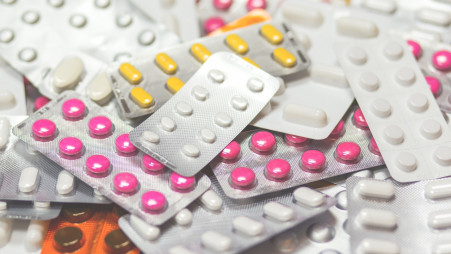Drugmakers take wait-and-see approach amid possible US tariff on pharma imports
So far, no tariffs have been officially implemented on pharmaceutical products

Highlights
- Only 8%-12% of US generic imports come from countries like Bangladesh
- Bangladesh's pharmaceuticals exports to US worth over $25m annually
- Exports to US make at least 10% of total pharma exports
- FDA-approved local drug makers at stake
Bangladeshi pharmaceutical companies are closely monitoring developments following the Trump administration's move to explore imposing tariffs on pharmaceutical imports, a decision that could reshape trade dynamics with the United States.
So far, no tariffs have been officially implemented on pharmaceutical products.
Now, Bangladeshi pharmaceutical exporters are adopting a cautious wait-and-see approach, ready to take strategic actions once the situation becomes clearer.
The sudden predicament comes after the US Commerce Department, on Monday, announced it had launched investigations into the potential national security risks posed by imports of pharmaceuticals and their ingredients, including finished drug products – pharmaceutical products that have completed all stages of manufacturing, including packaging, and are ready for distribution and use.
The probe, initiated on 1 April under Section 232 of the Trade Expansion Act, could span several months.
Under the law, the Commerce Secretary must present findings within 270 days, although administration officials have indicated the process may conclude sooner, according to Reuters.
The investigation will assess the impact of importing both generic and non-generic medicines, as well as active pharmaceutical ingredients (APIs) and other critical components used in drug production. Public comments on the matter will be accepted over the next 21 days.
The United States is a key export destination for Bangladesh's pharmaceutical giants, with companies supplying a range of medicines, including generic drugs used to treat conditions such as malaria, tuberculosis, and cancer.
Generics are the true copy of the innovator after patent expiration, and it involves little basic research. These are also easy to offer, as the molecule is already established by the innovator.
Currently, at least 10% of Bangladesh's pharmaceutical exports are destined for the US, with annual shipments valued at more than $25 million. Several local drug makers, including ACI, Eskayef, Renata, Square, Acme, Incepta and Beximco have also secured US FDA approval for exporting medicine to the US. ACI has also set up a dedicated factory named ACI Healthcare for export only medicines.
Commenting on the potential implications, Rabbur Reza, chief operating officer of Beximco Pharma, told The Business Standard, "At this stage, we can't predict the nature of the tariff – whether it will apply uniformly to both innovative and generic drugs, or vary by category. Until we have clarity, we won't make any strategic moves."
"Once there's a formal decision on tariffs, we'll assess the impact, consult with our business partners in the US, and then determine our course of action," he added.
Reza also noted that since Bangladesh is not a major player in the US pharmaceutical market, the anticipated impact would likely be limited, especially in comparison to sectors like garments – Bangladesh's second-largest export to the US.
"We [Bangladesh] mainly export generic medicines, which are already low-cost. While any new tariffs will be taken seriously, countries like India and China have far more exposure in the US market," Reza said.
Citing market data, he explained, "Of all generic medicines imported by the US, around 40%-45% come from India, 15%-20% from China, 10%-15% from the EU, 3%-5% from Canada, 5%-7% from Israel, 10%-15% are produced domestically, and 8%-12% come from other countries, including Bangladesh.
"So, the direct impact on Bangladesh is expected to be relatively minor."
Abdul Muktadir, president of the Bangladesh Association of Pharmaceutical Industries and chairman of Incepta Pharmaceuticals, echoed the sentiment.
"As of now, no tariffs have been imposed on pharmaceutical products. We can only gauge the implications once an official decision is announced. Until then, exports are continuing without any disruption."
On the matter, Mohibuz Zaman, chief operating officer at ACI Pharmaceuticals, also spoke on lines.
He said, "If the US imposes tariffs on medicine imports, it will definitely pose a challenge for us. However, we still have a 90-day window to prepare. Once a final decision is made, we will formulate our strategy accordingly."
"Since our export volume to the US isn't very large, we don't expect to be heavily impacted," he too noted.
He added, "The tariff war isn't just with Bangladesh – it's part of a broader trade strategy involving several regions. This also opens up an opportunity for us to expand our pharmaceutical exports to the US. But the challenge is, seizing this opportunity requires significant investment, which is currently beyond our reach."
He further mentioned, "Just days after President Trump's tariff announcement, an Indian pharmaceutical company declared a deal to acquire a US-based pharma firm for nearly $800 million. That kind of move is not possible for us right now, mainly because Bangladesh's regulatory framework makes overseas investments quite difficult."



 Keep updated, follow The Business Standard's Google news channel
Keep updated, follow The Business Standard's Google news channel
















